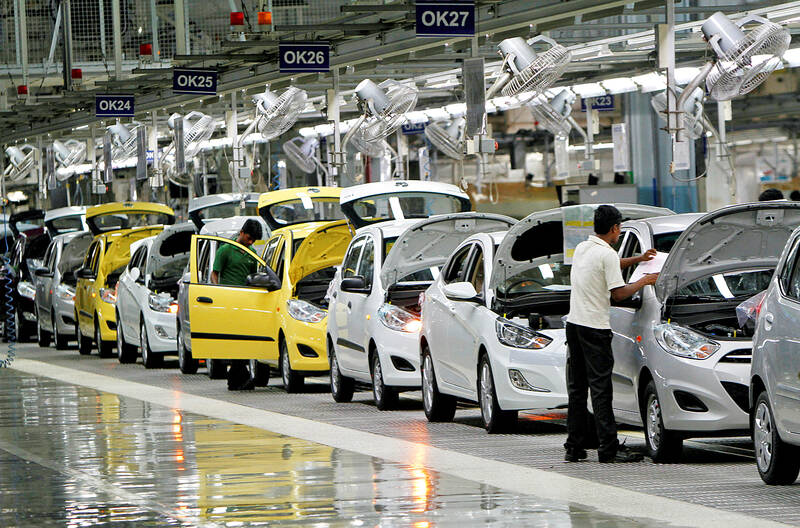Hyundai Motor Group and LG Energy Solution on Thursday announced that they are to build a US$4.3 billion electric battery plant as part of Hyundai’s new electric vehicle (EV) assembly plant in southeast Georgia.
The companies would split the investment, starting production as soon as late 2025.
Hyundai Motor Co chief executive officer Chang Jae-hoon said in a statement that the battery plant would “create a strong foundation to lead the global EV transition,” adding that the company wants to accelerate efforts to produce electrified Hyundai and Kia vehicles in North America.

Photo: Reuters
“Hyundai Motor Group is focusing on its electrification efforts to secure a leadership position in the global auto industry,” Chang said.
The South Korean automaker last year said that it would invest US$5.5 billion to assemble EVs and batteries in Ellabell, Georgia.
The site is to have 8,100 employees.
Garrison Douglas, a spokesperson for Georgia Governor Brian Kemp, said that the 3,000-job battery plant would be part of the 8,100 overall jobs and the US$4.3 billion investment would be part of the previously announced US$5.5 billion total.
The plant is to supply batteries for 300,000 EVs per year, which is the initial projected production of the adjoining vehicle assembly plant.
Hyundai has said that the plant could later expand to build 500,000 vehicles annually.
“This is exactly what we envisioned when Georgia landed the Hyundai Metaplant in May of last year and this project is the latest milestone in Georgia’s path to becoming the EV capital of the nation,” Kemp said in a statement.
In addition to the assembly and battery plants, auto parts suppliers have pledged to invest more than US$2 billion and hire 4,800 people in the region around the Hyundai site.
LG said this would be its seventh battery plant in operation or under construction in the US.

The New Taiwan dollar is on the verge of overtaking the yuan as Asia’s best carry-trade target given its lower risk of interest-rate and currency volatility. A strategy of borrowing the New Taiwan dollar to invest in higher-yielding alternatives has generated the second-highest return over the past month among Asian currencies behind the yuan, based on the Sharpe ratio that measures risk-adjusted relative returns. The New Taiwan dollar may soon replace its Chinese peer as the region’s favored carry trade tool, analysts say, citing Beijing’s efforts to support the yuan that can create wild swings in borrowing costs. In contrast,

Nvidia Corp’s demand for advanced packaging from Taiwan Semiconductor Manufacturing Co (TSMC, 台積電) remains strong though the kind of technology it needs is changing, Nvidia CEO Jensen Huang (黃仁勳) said yesterday, after he was asked whether the company was cutting orders. Nvidia’s most advanced artificial intelligence (AI) chip, Blackwell, consists of multiple chips glued together using a complex chip-on-wafer-on-substrate (CoWoS) advanced packaging technology offered by TSMC, Nvidia’s main contract chipmaker. “As we move into Blackwell, we will use largely CoWoS-L. Of course, we’re still manufacturing Hopper, and Hopper will use CowoS-S. We will also transition the CoWoS-S capacity to CoWos-L,” Huang said

Nvidia Corp CEO Jensen Huang (黃仁勳) is expected to miss the inauguration of US president-elect Donald Trump on Monday, bucking a trend among high-profile US technology leaders. Huang is visiting East Asia this week, as he typically does around the time of the Lunar New Year, a person familiar with the situation said. He has never previously attended a US presidential inauguration, said the person, who asked not to be identified, because the plans have not been announced. That makes Nvidia an exception among the most valuable technology companies, most of which are sending cofounders or CEOs to the event. That includes

INDUSTRY LEADER: TSMC aims to continue outperforming the industry’s growth and makes 2025 another strong growth year, chairman and CEO C.C. Wei says Taiwan Semiconductor Manufacturing Co (TSMC, 台積電), a major chip supplier to Nvidia Corp and Apple Inc, yesterday said it aims to grow revenue by about 25 percent this year, driven by robust demand for artificial intelligence (AI) chips. That means TSMC would continue to outpace the foundry industry’s 10 percent annual growth this year based on the chipmaker’s estimate. The chipmaker expects revenue from AI-related chips to double this year, extending a three-fold increase last year. The growth would quicken over the next five years at a compound annual growth rate of 45 percent, fueled by strong demand for the high-performance computing